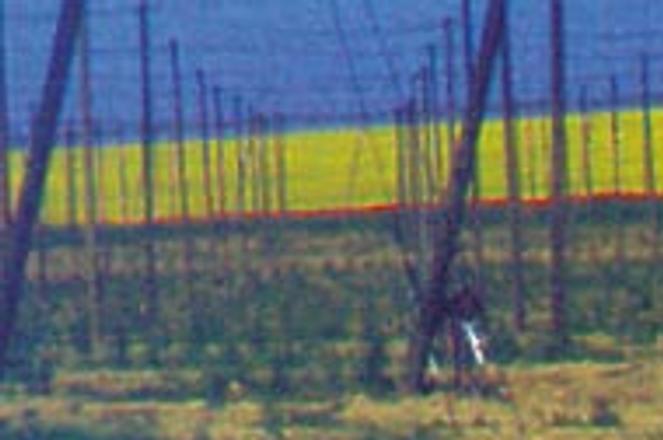Hops operations like this one cannot compete with foreign farms.Jela Pietužková
Although beer is still Slovakia's number-one alcoholic drink, with an average annual consumption of 94.8 liters per capita in 1997, Slovak hops farmers are sobering up to strong competition from cheaper, better foreign crops. Struggling to sell their produce both at home and abroad, hops growers across the nation have started to cut back production.
The cultivation of hops in Slovakia has plummeted in the past three years, dipping from 1,200 hectares grown in 1995 to the current level of 450 hectares, of which the majority is controlled by large private companies. Evidence of hops growers' troubles can be witnessed along country roads: Usually teeming with hop plants this time of year, many fields lie fallow for the first time in recent memory.
"We have had to decrease the amount of hops grown here because we are not able to sell them," said Pavol Kišac, chief agronomist at the western Slovak collective farm in Klátová Nová Ves, which is one of the top three hops producers in the country. "Breweries have supplies for 6 to 8 months, and they do not want our hops; we can not even sell them abroad."
A tough sell
Marian Borovský, director of the Slovchmeľ collective farm in Horná Streda, said that Slovak breweries' interest in domestically grown hops has declined considerably in recent years. "In 1993 we sold 450 hectares of hops to Slovak brewers; in 1997 it was only 200," he said.
Citing concerns with the quality of domestic hops, Slovak brewers are increasingly seeking foreign suppliers. "Slovak hops are [given the brand name] Žatecký hops, and they contain about 3.5 to 4 percent alpha [the active acidic ingredient in hops]," explained Borovský. "But the foreign hops [local] brewers use have about 8 to 10 percent alpha."
Local brewers also find it cheaper to import hops than to buy from Slovak producers. Slovak hops go for about 120,000 Slovak crowns ($3,500) per ton; Germans farmers can offer their hops for 80,000 Slovak crowns ($2,300).
Faced with cheaper, better-quality hops grown abroad, both small-scale hops growers and their national middleman, Slovchmeľ, have been feeling an economic pinch. "In 1996 and in 1997 we produced hops, and we sold it to Slovchmeľ," said Kišac. "But they were not able to sell the hops to breweries.
"We spent a lot of money on chemicals and machinery," Kišac continued. "And because we did not sell anything, we did not earn anything. So we labored for free."
Making it work
Slovak hops producers offers various ideas on how to remain alive in a competitive market. Some seek private solutions while others push for further government intervention.
The collective farm at Klátová Nová Ves plans to decrease hop growth by 10 hectares next season. "We plan to take the hops down, plant corn or wheat in its place, and then in the following season we want to bring hops back in," said Kišac. "That way we will have a clean field and better hops."
Revitalization of hops at the Klátová Nová Ves farm will span five seasons.
"We do want to sell our hops, and this revitalization should help us in obtaining a better quality," said Kišac. "We also want to plant various brands."
The Trenčín-region collective farm at Čachtice, Slovakia's second largest producer of hops, has its future ensured for the next three years. "We have signed a contract with a German company [stating] that they will buy our hops until then," said Ján Rehora, director of the collective farm at Čachtice. "We will see what will happen next."
Hoping to spur domestic beer and, in turn, hops sales, the government has placed an annual 532,000-hectoliter quota on Czech beer imports. Slovak hop producers claim further restrictions should be imposed.
"If we pushed that quota down to 200,000 hectoliters the whole industry could breathe again," said Michal Pramuk, director of the Slovak Association of Beer and Malt Producers. "We would not have lower sales; there would just be more Slovak beer at the checkout counter.
"We could use the 5 million hectoliters capacity our brewing industry has and return to profitability," Pramuk continued.


